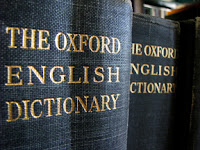The OED
Sure, my Scrabble Dictionary suffices for resolving most disputes in word games, but it doesn’t cut it for anything else. Sometimes you need to consult an authority.
When it comes to words, The Oxford English Dictionary (OED) reigns as the heavyweight―literally and figuratively speaking. After all, the OED is dubbed “The definitive record of the English language” and its weighty 20 volumes fill at least one reference shelf.
And talk about dedicated fans. When new words are added to the OED’s tomes, healthy debates rage internationally between bibliophiles, librarians, lexicographers, linguists, etymologists, academics and your average Joe/Jane.
I find it remarkable that more than 150 years after the OED’s origins, authors and bloggers alike continue to be inspired to write fiction and non-fiction works about the OED (e.g., The Professor and the Madman; The Meaning of Everything; Reading the OED; Treasure House of the English Language; Empire of Words), filmmakers and online video enthusiasts produce videos about the OED, the BBC airs television programs (“Balderdash and Piffle”) to enlist the public’s help with particular OED words, and there are countless other tributes in varied forms.
Knowing you can consult the OED, flip through its trusted print pages or search online through 600,000 words to uncover just the right word, its meaning, pronunciation, roots and illustrative quotations, well that’s brilliant.
Downright AWESOME!
Assorted tidbits:
When it comes to words, The Oxford English Dictionary (OED) reigns as the heavyweight―literally and figuratively speaking. After all, the OED is dubbed “The definitive record of the English language” and its weighty 20 volumes fill at least one reference shelf.
 |
| Photo by emdot on Flickr |
I find it remarkable that more than 150 years after the OED’s origins, authors and bloggers alike continue to be inspired to write fiction and non-fiction works about the OED (e.g., The Professor and the Madman; The Meaning of Everything; Reading the OED; Treasure House of the English Language; Empire of Words), filmmakers and online video enthusiasts produce videos about the OED, the BBC airs television programs (“Balderdash and Piffle”) to enlist the public’s help with particular OED words, and there are countless other tributes in varied forms.
Knowing you can consult the OED, flip through its trusted print pages or search online through 600,000 words to uncover just the right word, its meaning, pronunciation, roots and illustrative quotations, well that’s brilliant.
Downright AWESOME!
Assorted tidbits:
- Fantasy fiction author J.R.R. Tolkien worked for the OED from 1919 to 1920.
- The OED's original title was supposed to be less succinct: A New English Dictionary on Historical Principals Formed Mainly on the Materials Collected by The Philological Society and with the Assistance of Many Scholars and Men of Science.
- The first and second editions included royal dedications to Queen Victoria and Queen Elizabeth II, respectively.
- Two OED editors, James Murray and William Alexander Craigie, received knighthoods for their efforts.
- The most frequently quoted male and female authors in the OED are William Shakespeare and George Eliot.


A librarian at heart. :-)
ReplyDeleteTracy